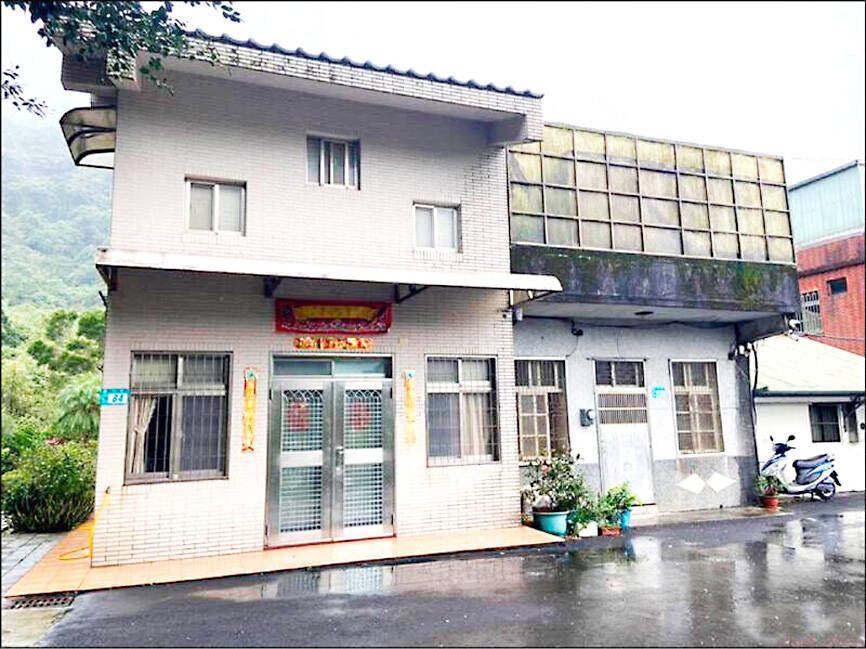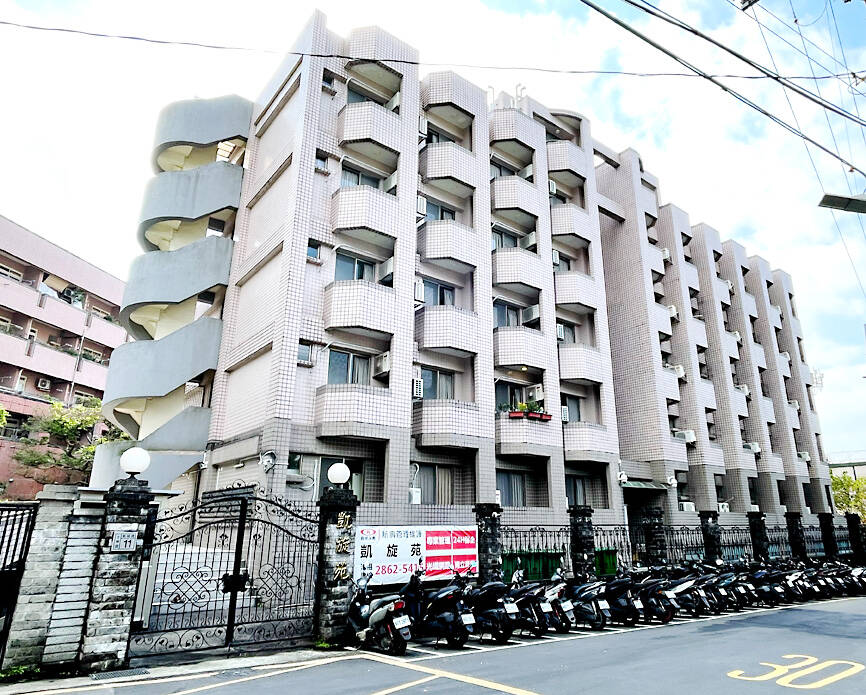The Democratic Progressive Party (DPP) and the New Taipei City Government are embroiled in a dispute regarding the construction timeline of the DPP presidential candidate’s property, with each side presenting evidence that paints contrasting narratives.
The New Taipei City Land Administration Department yesterday issued a statement saying DPP presidential candidate Vice President William Lai’s (賴清德) family home had been “constructed from ground level in 2003” and published aerial photographs it claimed to be evidence.
Lai’s campaign spokesperson Kuo Ya-hui (郭雅慧), meanwhile, countered the local government’s statement by presenting Lai’s family household certificate, which she said was evidence that the house in Wanli District (萬里) had existed since 1958.

Photo: Taipei Times
She said that the house had since undergone on-site renovation, but it was not a new building.
The ongoing sparring intensified on Sunday when the city government claimed the house was not similar to surrounding buildings, in an apparent response to Lai saying that the house had existed since 1958.
Kuo replied on Sunday evening that Lai’s childhood home had been standing since 1958 and that it was where he was “born and raised.”

Photo: Chu Pei-hsiung, Taipei Times
She expressed bewilderment as to why the department was continuing to release “biased news statements.”
Determining the year of construction is crucial because it could result in the building being deemed an illegal structure.
The city government in September said that the house could only be acknowledged as a legal building if the owner provided evidence that the structure predated 1981.
Lai emphasized during a policy presentation last week that all work on the structure had been completed before 1974, when the Regional Planning Act (區域計畫法), which prohibits unauthorized expansion, was passed.
The dispute surrounding Lai’s family home in New Taipei City has been in the headlines for months.
Both the Chinese Nationalist Party (KMT) and the Taiwan People’s Party (TPP) have repeatedly accused Lai’s family of illegally expanding the property and claimed that the building should have been torn down by the city government years ago.
TPP legislator-at-large nominee Huang Kuo-chang (黃國昌) has also accused Lai of not paying housing taxes on the Wanli property for more than two decades and demanded the payment of back taxes and the imposition of a fine.
In response to the criticism, Lai reiterated during a policy presentation last week that his old family home was one of the hundreds of renovated miners’ housing units built decades ago in New Taipei City, where there were once several mining districts.
However, over the years the mining companies closed down and many of the small units were purchased and renovated into larger buildings for safety reasons, Lai said.
Lai and TPP Chairman and presidential candidate Ko Wen-je (柯文哲) traded barbs on the matter over the weekend, with Ko saying that the way Lai has dealt with the housing issue suggests he “definitely would be a dictator,” in a video message played at a labor protest in Taipei.
KMT presidential candidate Hou You-yi (侯友宜) is the incumbent New Taipei City mayor. He took a leave of absence in September to run for the top job.
Meanwhile, the DPP has criticized Hou over the Kaisuan Condominium (凱旋苑), formerly known as the Da Chiun Building (大群館), which is owned by Hou’s family and is used as off-campus housing for Chinese Culture University students.
The DPP yesterday criticized Hou for hiking the dorm rent every year and being “greedy” for taking money from young people.
The number of rooms inside the dorm increased from 99 to 103, and the DPP alleged the increase was so it could have more rooms to rent out “and suck the blood from students.”
The action is a reflection of Hou caring only about his self-interest and not that of the young people’s plight, the DPP said.
In response, Hou yesterday said his wife inherited the property from her family 20 years ago and that it is not ilegally built and taxes are paid in line with the law.
Additional reporting by Chen Cheng-yu

An essay competition jointly organized by a local writing society and a publisher affiliated with the Chinese Communist Party (CCP) might have contravened the Act Governing Relations Between the People of the Taiwan Area and the Mainland Area (臺灣地區與大陸地區人民關係條例), the Mainland Affairs Council (MAC) said on Thursday. “In this case, the partner organization is clearly an agency under the CCP’s Fujian Provincial Committee,” MAC Deputy Minister and spokesperson Liang Wen-chieh (梁文傑) said at a news briefing in Taipei. “It also involves bringing Taiwanese students to China with all-expenses-paid arrangements to attend award ceremonies and camps,” Liang said. Those two “characteristics” are typically sufficient

A magnitude 5.9 earthquake that struck about 33km off the coast of Hualien City was the "main shock" in a series of quakes in the area, with aftershocks expected over the next three days, the Central Weather Administration (CWA) said yesterday. Prior to the magnitude 5.9 quake shaking most of Taiwan at 6:53pm yesterday, six other earthquakes stronger than a magnitude of 4, starting with a magnitude 5.5 quake at 6:09pm, occurred in the area. CWA Seismological Center Director Wu Chien-fu (吳健富) confirmed that the quakes were all part of the same series and that the magnitude 5.5 temblor was

The brilliant blue waters, thick foliage and bucolic atmosphere on this seemingly idyllic archipelago deep in the Pacific Ocean belie the key role it now plays in a titanic geopolitical struggle. Palau is again on the front line as China, and the US and its allies prepare their forces in an intensifying contest for control over the Asia-Pacific region. The democratic nation of just 17,000 people hosts US-controlled airstrips and soon-to-be-completed radar installations that the US military describes as “critical” to monitoring vast swathes of water and airspace. It is also a key piece of the second island chain, a string of

The Central Weather Administration has issued a heat alert for southeastern Taiwan, warning of temperatures as high as 36°C today, while alerting some coastal areas of strong winds later in the day. Kaohsiung’s Neimen District (內門) and Pingtung County’s Neipu Township (內埔) are under an orange heat alert, which warns of temperatures as high as 36°C for three consecutive days, the CWA said, citing southwest winds. The heat would also extend to Tainan’s Nansi (楠西) and Yujing (玉井) districts, as well as Pingtung’s Gaoshu (高樹), Yanpu (鹽埔) and Majia (瑪家) townships, it said, forecasting highs of up to 36°C in those areas